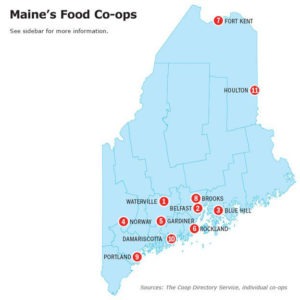
A cooperative is a business that is owned and operated under the principle of “one share, one person, one vote.”
By contrast, in corporations, the wealthy own many shares; their operating principle is “one dollar, one vote.” Today, over one billion people worldwide are member-owners of cooperatives. In the United States, credit unions (cooperatively owned banks) alone have over 120 million member-owners.
Co-ops come in four main types: consumer co-ops (everything from credit unions to the retail giant REI), producer co-ops (most farmer co-ops, for instance), purchasing co-ops (Ace Hardware is a prominent example), and worker co-ops. A co-op may also have multiple types of members—these are called multistakeholder co-ops.
Historically, most co-ops in the United States have been consumer co-ops, but worker co-ops are becoming increasingly prominent as a strategy to simultaneously build wealth, community economic power, and self-governance capacity. Increasingly, worker co-ops are seen as central to building a solidarity economy.














